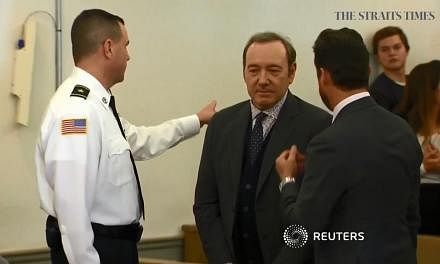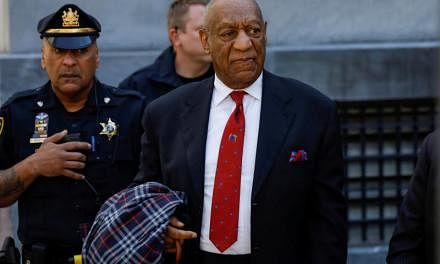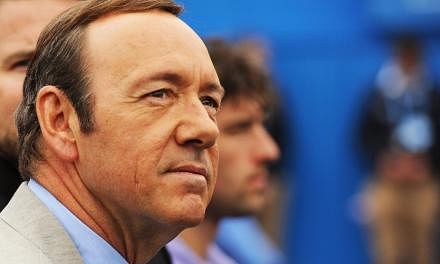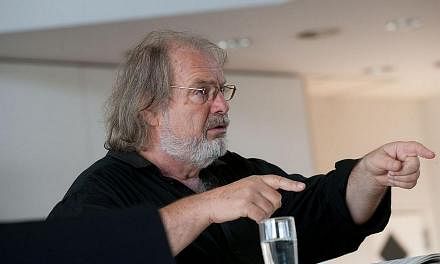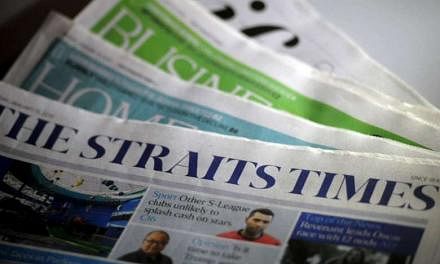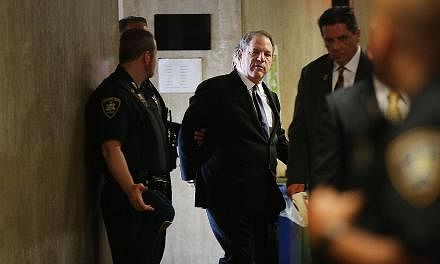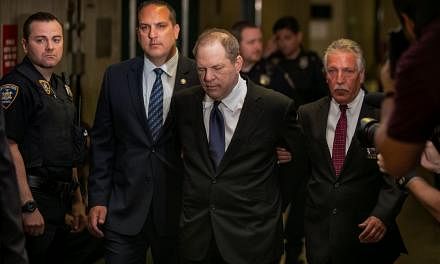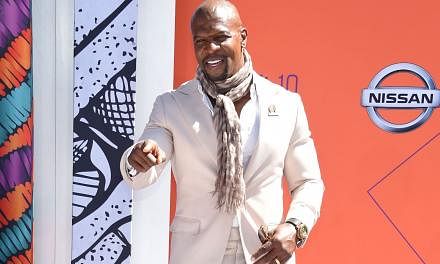NEW YORK (NYTimes) - A law firm representing Morgan Freeman sent a 10-page letter to CNN on Tuesday (May 29) protesting a report last week in which several women, mostly anonymous, said they had experienced some form of sexual harassment from the actor.
The letter said the network's reporting was a "product of malicious intent, falsehoods" and reflected "an absence of editorial control, and journalistic malpractice." The letter also said "it is clear that CNN has defamed Mr. Freeman." Freeman's team demanded a retraction and a public apology.
Most of the letter involves Chloe Melas, the CNN reporter who was also one of the two authors of the piece. Melas wrote that Freeman made sexually suggestive comments to her at a publicity event last year for Going In Style, a film starring Freeman, Michael Caine and Alan Arkin. After that, she began looking for other women who had worked or interacted with Freeman and eventually found several who described unwanted touching or suggestive comments, she wrote.
Freeman's lawyers said that Melas' reporting on a story that she was part of made her biased from the start.
"As a supposed victim of the article's subject, Ms. Melas lacked the requisite impartiality and objectivity to fairly cover the story she was chasing," said the letter, written by Robert M. Schwartz of the Irell & Manella law firm in Los Angeles. "Under those circumstances, CNN should not have allowed her to write it."
In a statement, CNN did not back down from its reporting.
"The unfounded accusations made by Mr. Freeman's lawyer are disappointing and are difficult to reconcile with Mr. Freeman's own public statements in the aftermath of the story," the network said.
"CNN stands by its reporting and will respond forcefully to any attempt by Mr. Freeman or his representatives to intimidate us from covering this important public issue."
On Thursday (May 24), the day the article was published, Freeman said in a statement that he had never meant to make anyone feel uneasy. "I apologise to anyone who felt uncomfortable or disrespected - that was never my intent," he said.
The next day, he reiterated his apology but also objected to a section of the report in which women who were employed at his production company described it as a "toxic" work environment.
The letter sent by Freeman's lawyer Tuesday focused on the incident that began Melas' pursuit of the story. Part of it was captured on video: Freeman, flanked by Arkin and Caine, saying to Melas, who is interviewing them: "Boy, do I wish I was there."
The letter said that Freeman was responding to a story Caine had just finished telling about a time when he had embarrassed himself. Melas, who was six months pregnant at the time, interpreted it as a sexual remark directed at her. Her report said that it was one of several times during the event that Freeman had looked at her and said some variation of "I wish I was there." The letter also alleges that Melas tried to "prod" people she interviewed to speak negatively about Freeman and that remarks from Tyra Martin, a producer for WGN-TV in Chicago, were mischaracterised.
The CNN report said Freeman would often comment on Martin's appearance during interviews and that Martin always took it as a joke, except for one comment about her skirt that she said "gave me pause but I never felt uncomfortable." CNN described Martin as feeling that this "one incident crossed a line." After the CNN report was published, Martin said on a WGN news program that she did not believe she should have been included in an article about women troubled by Freeman's behavior.
"To be grouped in it, I don't feel offended, but just disappointed," she said.
The letter does not address other allegations in the CNN piece, including one from an unnamed production assistant who said that Freeman tried to physically lift her skirt until Arkin told him to stop. After CNN published its report, Maggie Parker, a contributor to People magazine, wrote a first-person piece that said when she asked Freeman during a 2013 interview, "If you could do one magic trick, what would it be?" he responded, "You wouldn't have a stitch on," suggesting he wanted to see her naked.
The letter lawyer does not threaten a lawsuit, but it said that Freeman was "reserving all of his rights, claims and remedies against CNN and its employees."
It is unusual in journalism for a reporter to be a source in her own investigative report, though the article disclosed her role, and it was not the first article during the #MeToo movement in which a reporter's article described a personal experience. In an interview after the report was published, Melas said that CNN did not have an issue with her involvement. She reported the article with An Phung, an editor at CNN.
Indira Lakshmanan, the chair in journalism ethics at the Poynter Institute, said that while it was standard practice that reporters who cover politics or sensitive issues not be partisan or activists, it was "impractical to suggest that someone who has been affected by something should never report on it."
"Would we say that a black reporter can't report on racism because he or she was personally affected and therefore 'biased?'" she said in an email. "I don't believe that Morgan Freeman and his lawyers would like the story any better if it were the same story with the same information, without Melas' byline or involvement other than as a source."
The early fallout for Freeman has been limited. Visa said that it was suspending his use as a narrator for its commercials, and TransLink, the Vancouver-based transit system, said it would pause a campaign in which Freeman was to make loudspeaker announcements. Studios handling coming films with Freeman have not commented, but there have been no reports of his losing acting roles.

